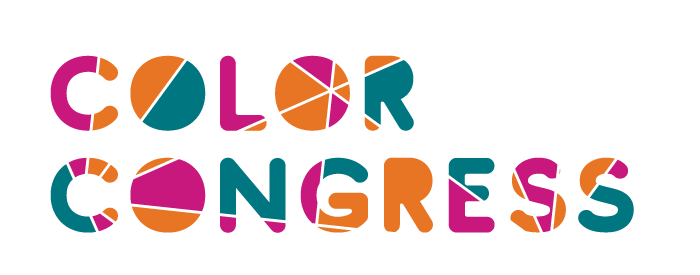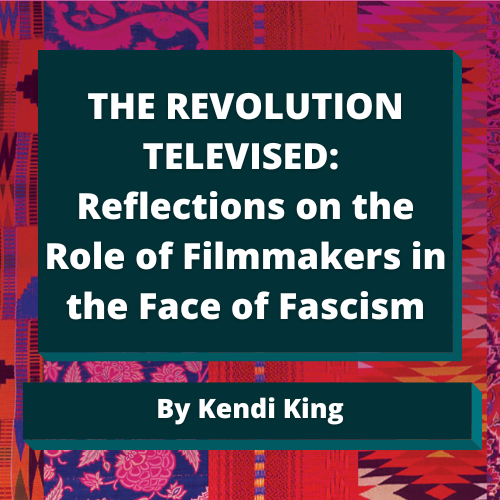THE REVOLUTION TELEVISED: Reflections on the Role of Filmmakers in the Face of Fascism
By Kendi King, Rada Collaborative
The Revolution is always on my mind, but I’d never felt it so close as September in Chicago.
There was an energy in the city, working into my chest, familiar and new all at once. I thought of Fred Hampton.
On September 12th, the first day of the 2025 Color Congress National Convening, the largest gathering of documentary film leaders of color in the United States — Immigration & Customs Enforcement (ICE) shot and killed 38-year-old Silverio Villegas González in his car, moments after he dropped off his two young sons at school. At the same time, Chicago’s Mexican Independence Day Parade was taking place, and being met with police hostility.
The weather was hot.
The people were angry.
And here I was, watching from a conference room window.
I should preface this by saying, I’m 23-years old.
I just graduated college. I’ve got my first adult job as the Coordinator at Rada Collaborative, a Brooklyn-based non-profit servicing BIPOC filmmakers and artists under award-winning makers Joe Brewster and Michèle Stephenson. I’m 23 and learning how much I don’t know yet, about myself, my art and practice, and the role it plays at this moment in time.
The only thing I seem to know for sure is this energy in my chest. Something like anger.
Anger at racism, poverty, at what racism and poverty do to daily life — at my cousin for being locked up my first semester of college, at myself for being in college while my cousin sat in jail, at myself for studying film while my country descended deeper into darkness and kept my family imprisoned — a series of inevitabilities.
It was always going to end like this, and that angered me like nothing else.
I’m only now learning how to channel this energy, seeking the role art plays in this conversion, and finding ways to weaponize storytelling tools for the liberation of Black people.
So you can imagine the jolt of energy going through me on the opening night of the Color Congress Convening — where gathered in a conference room before me, in the city of Fred Hampton, stood the leading organizers of the modern BIPOC cinema-for-liberation movement.
These are the people doing boots on the ground work of equipping Black and brown people with tools of self preservation through storytelling — working with the most deeply impacted populations in the U.S.; incarcerated youth, foster children of color, refugees and undocumented people, unhoused youth and adults, and many more largely ignored communities whose needs are at a current high.
If I was to pursue a Revolution of impact, I needed the guidance of these exact leaders — all conveniently conversing around a very well stocked open bar.
I downed my white wine and prepared to plot.
My main questions were this…
Is pursuing art in the face of rising fascism in the U.S. irresponsible?
How can film be used to improve the lives and living conditions of people in a tangible way?
What is my responsibility to my community as a Black woman with the privilege of pursuing art professionally?
What actionable steps can I take towards a revolution for the liberation of all oppressed people?
Through a weekend of workshops, group discussions, breakout conversations, and shared thoughts over meals — here were some of the lessons I gleaned from the foremost organizers in art for liberation…
“We don’t just exist to oppose a thing, but to build something as well”
Pooling of resources and connections is the only path to a liberated future — coalition.
“Scarcity is the biggest colonial lie”
Quantitative data is not a supreme metric over qualitative. There’s more than enough resources to go around. Anything that says otherwise is likely rooted in white supremacy.
“If we don’t partner together, we perish together”
There is value in connecting with organizations who aren’t film- or art-focused, but community- / mutual aid- / social work-centered as they know the best ways to organize people in our immediate community.
“Moving in coalition isn’t easy, it isn’t fast, but it is necessary”
Anything can be a weapon for change; a camera, a pen, a performance — as long as it’s done in community.
After my weekend with Color Congress and the incredible artists, activists, and culture workers they convened, my understanding is this — the wealthy and political elite are deeply invested in ensuring we the people have no idea what is happening to each other. As prolific jazz poet Gil-Scott Heron famously said,
“The revolution will not be televised.”
Yet here I am, working in film and television, trying to find the revolution.
“The revolution will not be right back
After a message about a white tornado
White lightning, or white people”
I’m 23-years-old trying to outrun fascism, armed only with stories. It has never felt like enough.
“The revolution will not be televised
There will be no pictures of pigs shooting down brothers on the instant replay
There will be no pictures of pigs shooting down brothers on the instant replay”
Mainstream media isn’t reporting relentless protests in Chicago, daily ICE abductions in New York City, increased police and military training facilities in Atlanta because they don’t want us to see that our suffering is the same. If coalition across identity was presented as a viable option for liberation…
“The revolution will be no re-run, brothers
The revolution will be live”
I am not mainstream media. I am not controlled by political financing or any agenda but my own, and neither are the storytellers around me. The U.S. government is targeting independent art and media because they know the power it holds. I can televise the revolution on my block, to my neighbors, in my community, to the people of Brooklyn, to my friends and family — through film screenings that center in-person gathering and meaningful conversation, showing work that shifts negative narratives we’ve been told about ourselves. I can divest from mainstream media controlled by colonizers instilling colonial narratives (news, social media, popular streaming services), and reinvest that energy into local art and culture (public programming at libraries, museums, and community centers, dinner parties and dancing at friends homes, freestyle rapping & singing on the stoop). Art is everywhere.
The revolution will not be televised, but best believe it will be archived by artists.
Let’s get outside.
Kendi King is a filmmaker born in Atlanta and raised in Brooklyn, currently staffed as the Coordinator at Rada Collaborative. She is a graduate of Spelman College with a B.A. in Documentary Filmmaking. Her work is concerned with uplifting radical stories by equipping oppressed communities with the tools to tell them. Her projects have screened at festivals such as DOC NYC, Tribeca Festival, Bronzelens, and many more.

